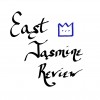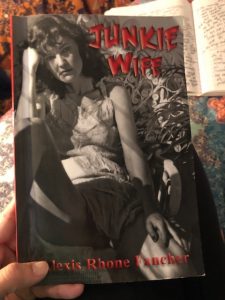A Weekend Getaway
by Alejandra Castillo
Back to Tijuana,
the United States’ lousy neighbor.
The one that knocks on your door at 3am
asking for a glass of water
and you don’t give it to him
because you are the United States of America
and your neighbor is dirty
and ultimately you don’t fucking have
to quench his thirst.
So you take your rifle and scare your neighbor away
but he keeps coming back
because he really is that goddamn thirsty
and his house has no running water
and—you get the point.
As the migra escorted you outside you felt a little infamous
among hundreds of women with blisters on their hands.
You’re holding your breath with your mechanized arms.
Exiled for working without permission from Uncle Sam.
Once again in TJ, where it all began.
Except now you’re 23 y en la edad del desmadre.
La migra asks you and your girlfriends your names.
Carmela suggests you all give fake ones.
You take it further and suggest celebrities.
When the gringo asks you to identify yourself,
you say you are Angélica María.
Your friend Roselva is now Lucero
and Carmela is now Thalía.
So when the factory owner tries to import you all back
he can’t find any of you. You pay a coyote to guide you home
to the glasses factory and the East L.A. dance hall.
Deported on a Friday night.
Spent the weekend in Mexico.
Crossed the crumbling desert on Sunday.
Showed up to work promptly on Monday.
That’s the kind of girl you are.
180
by Alejandra Castillo
 by
by
Nomad
by Alejandra Castillo
The lawlessness of the river
runs through my veins.
I don’t know how to swim,
I know how not to drown.
It’s easy to run away from home
when there’s over a dozen kids
crawling along the mud like pigs.
My daughter asks, who do you miss?
I say, I never was too close to anybody,
but I remember the butcher and his son,
who raped me.
Daughter, we are gypsies.
Home is a dream we had one day.
Lex as Persephone
by Alejandra Castillo
I wanted to die and reincarnate
as the Brody Dalle
of a parallel universe.
One without the arrogance of her green eyes, glazed.
To be punk without the needles.
To be punk without the meds.
My soft lips pressed against the microphone one day
and I felt nothing.
Fixed my dumb stare straight across an ocean
of bodies who wanted to fuck
everything, myself included,
each other.
I ate the microphone.
My lips were bleeding.
Brody, I tried
to be a better version of you.
But I found myself bored with fame.
Singing the same old songs
to the same demented crowd.
Even nudity gets dull.
You and I, Brody, we’re not bad people.
When we signed our souls away
we didn’t do it for the fame.
You and I never wanted to be
goddesses of any underworld.
We never wanted gutter punks
to scream our names.
I paid the price, bound to this machine
that feeds me.
My manager preps me every night, he says
he’s never known a rockstar with no pain.
Lex as Trinity Part II
by Alejandra Castillo
She woke up in the middle
of the night gasping for air.
She had forgotten how to breathe.
Poor thing. One hour sleeps.
Foodless days. Singing
“God, help the outcasts”
on her midnight walks
to churches that were never
goddamn open.
Lex wasn’t religious,
only when she ached.
But Lex was still Lex. Performed
exquisitely. Fans by the handful. All
was good onstage. Backstage was hell.
Her manager said, Lex, you are dead,
you are queen of your underworld.
One day she almost died.
Crowd surfed into a hole of stupid
bodies. Cracked
her head in two. Cried
with primal gratitude. Clung.
Surprise. You didn’t want to die.
__________________
Alejandra Castillo is a poet from East LA and Guadalajara. Her poetry has appeared in ONE: Body, Mind, Spirit and Hinchas de Poesia.





